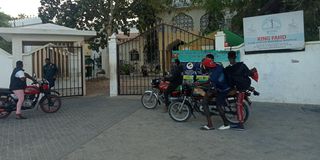Inside Lamu's Sh4 million plan to digitise health records

The King Fahd Hospital in Lamu County. The county government plans to allocate Sh4 million to digitise health records at all public health facilities in order to curb drug thefts.
Fatma Bulo, a resident of Ndhununi village in Lamu’s Boni forest, is distraught.
She had travelled 60km to get to King Fahd Hospital, the main referral facility in Lamu County.
“I am discouraged. I have been checked by medics and prescribed drugs, only to be told to buy them from private hospitals or pharmacies in town,” she said.
“What is the relevance of having public health facilities that are supposed to cater for our welfare but we don’t get the services required?”
But Ms Bulo’s frustrations mirror those of many others in remote villages across the county who receive poor service at almost all public health facilities in the region.
The health sector in Lamu has faced heavy criticism over the years due to the poor state of its public hospitals and dispensaries, most of which lack drugs and other supplies.
The county has four major hospitals and over 30 dispensaries, all of which experience drug shortages though officials purchase medicines worth millions of shillings.
The major facilities include King Fahd Referral, the largest, and Mpeketoni and Mokowe sub-county hospitals in Lamu West.
There is also Faza Sub-County Hospital in Lamu East.
But they lack staff, drugs and other supplies.
“These facilities are just empty buildings. How can we have a county referral hospital that sometimes doesn’t even have a simple paracetamol or amoxicillin? The county government should be serious about this,” said Mr Abdalla Ahmed.
There is, however, a ray of hope after Governor Issa Timamy’s administration unearthed a drug-theft syndicate allegedly orchestrated by medics in the public hospitals.
The theft has been going on for a long time and is believed to be the key reason behind poor services at most of the county's public health centres.
Mr Timamy said in an interview that his administration had allocated Sh4 million to digitise health records at all public health facilities in order to curb drug thefts.
He lamented that though the county buys drugs frequently, the medicines do not reach patients, ending up in the hands of selfish medical practitioners.
The drugs are allegedly stolen and stocked in private chemists and clinics run by medics.
The digital system will capture the details of patients and prescribed drugs, the governor said.
It will also capture the services given to patients to ensure that the devolved government only takes care of what the patients get.
The system will be installed at hospital pharmacies and labs, where most of the cheating is believed to happen.
Digitisation will also help to ensure that hospitals only stock what patients need.
The lack of tracking systems has led many counties to fund services that patients do not even get.
“The Lamu County government has been buying drugs … with the latest consignment being of Sh30 million that was dispatched recently,” Mr Timamy said.
“It’s surprising that patients don’t get these drugs. We’re aware some medics are stealing drugs in our hospitals and I am sending a warning to those health staff doing so.”
He added: “To stop all this and ensure there’s efficiency in health service provision in our hospitals and dispensaries, we’ve set aside Sh4 million this financial year to digitise health records in all our public hospitals.
“By doing so, we shall be able to monitor and track how drugs are consumed or available, given to what patient, and for which treatment.
“Even if I am in my office, I’ll be able to know what is happening in our hospitals just by the click of a button. This will completely stop drug theft in the concerned health facilities and boost general service provision.”
Sources in the county government said errant pharmacists and laboratory technicians have also been sending patients to specific chemists to buy medicines.





